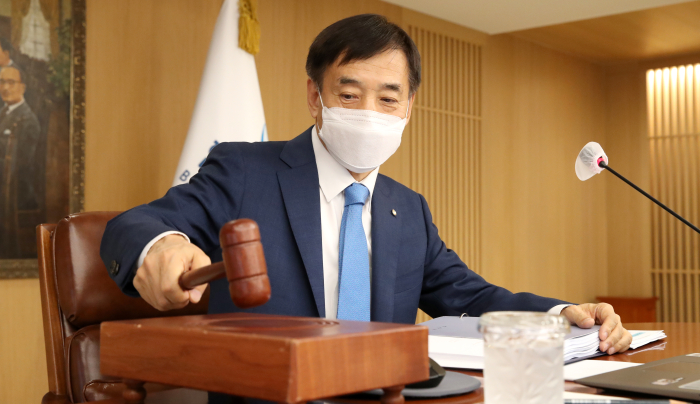Economy
Bank of Korea ends 15-mth ultra-easy monetary stance
BOK raises interest rates by 25 bps in first rate move in 15 months, signaling liquidity party is over
By Aug 26, 2021 (Gmt+09:00)
2
Min read
Most Read
Samsung shifts to emergency mode with 6-day work week for executives


CJ CheilJedang to sell feed, livestock unit for $1.4 bn


Samsung Electronics' key M&A man returns; big deals in the offing


Affinity to buy SK Rent-a-Car at $572 mn, more deals expected


Keppel REIT to sell Seoul-based prime office T Tower



The Bank of Korea has ended its ultra-easy monetary stance by bumping up the base interest rate by 25 basis points from a record-low 0.5% on Thursday, as Asia's fourth-largest economy is stepping up efforts to curb soaring household debt and rising inflationary pressures.
The central bank's Monetary Policy Committee on Aug. 26 decided to raise interest rates to 0.75% from 0.50%, in its first rate hike since Nov. 30, 2018 when it lifted the policy rate to 1.75% from 1.50%.
The overnight inter-bank call rate had remained at a record-low 0.50% since the Bank of Korea cut the rate by 25 basis points in May 2020.
The rate increase bucked the market consensus that the central bank would likely skip a rate move this month, because the global spread of the Delta variant of COVID-19 weighed on the economic outlook.
But South Korea has proven resilient to the global pandemic, powered by robust exports and private consumption. The South Korean economy in the second quarter of this year expanded at the fastest annual pace since the fourth quarter of 2010.
Data from Shinhan Card, the unit of the country's leading bank Shinhan Financial Group, shows credit card usage in July jumped 7% from a year earlier, which translated into a 2.3% month-on-month rise.┬Ā
South Korea's household credit is estimated to have surged to a record-high 1,805 trillion won ($1.5 trillion) at the end of June. Household credit includes both household borrowings and outstanding credit card balances.
In addition, the softening won currency added to inflationary pressures by lifting the conversion value of foreign goods.
SHIFT TO TIGHTENING
With the rate hike on Thursday, South Korea has put an end to its ultra-low interest rate policy employed over the past 15 months aimed at fighting the economic slowdown worsened by the global pandemic.
Now the central bank is likely to accelerate its monetary tightening stance, with the next rate hike expected to happen in October at its earliest, economists said.
To shore up the economy, the Bank of Korea cut the base rate by 25 basis points each in July and October, 2019. In March last year, it held an interim monetary policy meeting to slash the rate by 50 basis points to 0.75%, followed by a 25-basis-point cut to a record-low 0.5% in May in the same year.┬Ā
The regulatory Financial Supervisory Service earlier this month called for domestic banks to curb new consumer lending as the residential property market showed no signs of easing.
South Korea's household debt at the end of June increased by 2.3%, or a net 41.2 trillion won, compared to three months before.
The average selling price of apartment units in Seoul picked up to 1.1 billion won in July, a 181 million won rise from a month earlier. It surpassed the 1.1 billion won threshold for the first time.┬Ā
Write to Ik-hwan Kim at lovepan@hankyung.com
Yeonhee Kim edited this article.
More to Read
-
 S.Korea's potential growth rate drops to record low
S.Korea's potential growth rate drops to record lowSep 14, 2021 (Gmt+09:00)
3 Min read -

Comment 0
LOG IN


